
Combating desertification with water-saving irrigation technology in combination with a sustainable management of soil, erosion and vegetation

Funding:
Funding of AiF, BMWi, and PRO INNO/NEMO
Project Duration:
01.7.2008 – 31.03.2011
Project Manager:
Alexandra Oberdieck
Homepage:
–
The fight against the desert is also a fight against time. In the north of China, desertification is progressing at an extremely rapid rate: a silted zone which is 4.500 km long and 600 km wide is threatening the fertile arable land and thus also the livelihood of the rural population. The denudation of fertile soil through erosion has a direct impact on the lifes of some 170 million people. The Kubuqi Desert, the seventh largest desert area in the world, is located right next to the capital city of Beijing and is thus endangering cultivable land which is existential to supplying this conurbation. The excessive exploitation of land and water resources as well as the destruction of the natural vegetation are accelerating this development. An important means of maintaining arable land is green vegetation zones. By reducing wind speeds, they minimise the erosion of fertile soil as well as evaporation intensity. This means that less irrigation is needed on adjacent fields.
Engineering know-how from the Federal States of Bremen and Brandenburg will contribute to the development of a novel concept for vegetation zone management. In the framework of “DesertDrip”, a project funded by the German Federal Ministry of Economics and Technology, WATERMAN, an enterprise specialised on water and irrigation technologies, the ttz Bremerhaven and the Center for Environmental Research and Sustainable Technology at the University of Bremen are pooling their skills. On a test site of the Chinese Academy of Forestry Science in Hohhot in Inner Mongolia, a combination of irrigation, erosion protection and cultivation management is being developed which can also withstand the extreme climatic fluctuations common in the region. Each of the three players is focusing on one of the following priorities:
Cultivation management
ttz Bremerhaven is responsible for selecting, combining and positioning regional plants in the vegetation belts. Not only the functionality as erosion protection, the specific absorption of water and nutrients of a plant are essential, but also later benefits for the population from e.g. sale of wood and fruit. A mix of native species of trees and other plants gives the plantation stability and raises the biodiversity of a region.
Irrigation management
With the Dipstick® System, which was amongst the finalists for the Bremen Environment Prize in 2004, WATERMAN aims to improve the water economy of the wind protection plants. By irrigating the plant roots, evaporation losses and intrusion of saltwater into the soil can be minimised.
Erosion protection
The ReviTec® process developed by the Center for Environmental Research and Sustainable Technology/University of Bremen increases erosion protection at the vegetation strips. “Vivified land” is created as a plant bed from a substrate which facilitates plant cultivation.



